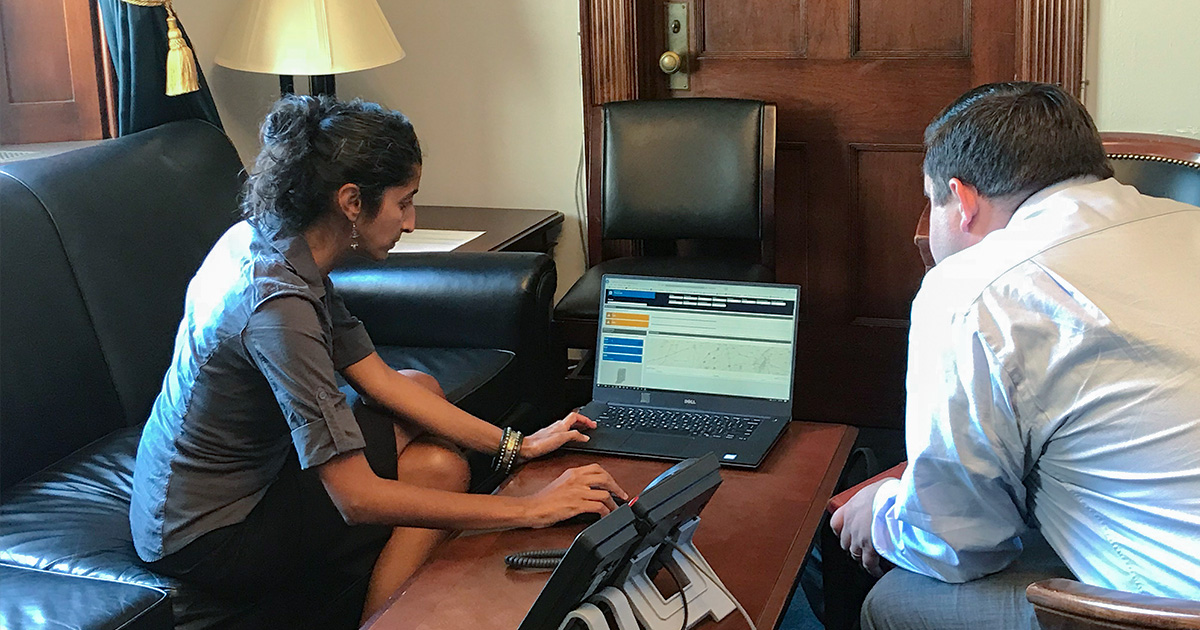After policy researchers put in the long hours designing a study, collecting and analyzing data, and reporting the results, how can they ensure that people will learn what they’ve found and understand why it matters?
On this episode of On the Evidence, economists Jennifer Doleac and Kosali Simon share lessons from their experiences interpreting and translating policy research for media interviews, Twitter, podcasts, and elsewhere.
Doleac is an associate professor of economics at Texas A&M University, the director of the Justice Tech Lab, and the host of the Probable Causation podcast. Simon is a professor at the Paul H. O’Neill School of Public and Environmental Affairs at Indiana University Bloomington, as well as the associate vice provost for health sciences at Indiana University Bloomington. Earlier on the day of the interview, they participated in a panel session on communicating about policy research at a conference hosted by the Association for Public Policy Analysis & Management.
Click here to listen to the full interview or read the following abridged and edited Q&A blog based on the conversation.
Where have you encountered challenges in making your work relevant to broader audiences, including policymakers, practitioners, and the media?
Simon: One challenge is that we donֹ’t have training in this area. We learn how to do the research, but we don’t really learn how to communicate what we do, why we do it, how we do it, and what our results mean for practical applications. Academic work is often written in a way that fits specialized journals and is not aimed at the average person out there in society who we imagine will actually use our work; [it’s as if we] imagine that there’s some genie who’s going to do the [communications and outreach] part for us. It’s hard to fit [communications] into all of the things we are specifically asked to do, especially for a tenure profile. There has to be some way in which research translation fits into our objective function.
Doleac: The other big challenge is talking to people who are not experts in your field. As an academic, you become increasingly specialized. We all have our own jargon. We’re both economists, and economists speak our own special language, using phrases like “objective function.” The average reporter or policymaker will have no idea what we’re talking about if we don’t become better at explaining in an intuitive way.
Have you thought about what proportion of your week or your average workday you’re supposed to be spending on communicating about your research?
Doleac: At this point, I personally spend, on average, 8 to 10 hours a week on what I broadly call engagement activities. That’s talking with reporters, speaking at more policy-oriented conferences or events, working on the podcast—anything that’s not academic. I would like to be spending less, but at the same time, it’s important to me to play this translational role on research, so I’m willing to make that trade-off.
Simon: With time, it becomes easier to think about how to incorporate it into what you do. It shouldn’t be thought of as something that you can only do at a 10-hour-a-week scale. You should take a little bit of time to think, “How would I explain what I’m doing to somebody else?” It’s such a complement to how you are going to write your abstract, how you are going to present in a conference, and how you’re going to talk about your research with your students.
How do you try to make your research more relevant to a broader audience?
Simon: I think you always go into research hoping that it’s something somebody other than you also cares about, but you need to identify the audience first. It need not be that the first interaction is going to be with a journalist or with a Hill staffer. Instead, communicate your research with all sorts of people who could help you think through why this is important to continue, what the next questions are, but also who can give you the institutional background and feedback you need to refine your questions. They could be colleagues within your department who are not within your specific area. They could be students. They could be local organizations. They could be colleagues outside of your department but within your school or within your university.
What is your philosophy about using Twitter? What purposes does it serve, and what has been your experience with using it?
Doleac: Twitter is a great way to increase your own visibility and get your profile out there as an expert in a particular area. One way that I do this is to amplify the good work that comes across my desk or that I happen to see at seminars or conferences. Our comparative advantage as researchers, as academics, is that we see interesting research all the time, and it’s relatively easy for us to tell if itֹ’s good research or not. Even if all you do is tweet out the title, the name of the author, a link, and a screenshot of the abstract, people will follow you because you’re a resource for good work. I tweet out a lot of crime papers, and people will follow me if they’re interested in what the latest research is on crime.
How do you try to gauge the interest in and relevance of your research?
Simon: One of the ways we judge the new questions we’re going to look at is that we think about the evidence that’s out there on an issue, and we identify gaps. Among those gaps, you probably want to pick things that people will care about. One of the things researchers [ask] is, “Is this the biggest problem society faces in my narrow research area? Or is it something else?” Unless you have some other reason, like data availability, for why you went to the second question, we would be addressing what seems to be the most important—and we know that this is what matters to journals as well. Not just, did you cleanly identify something, but is it something we really want to know?
All of that just means that we should be thinking about relevance as we are approaching research. It’s not just, am I going to have that conversation with the policy audience afterwards, but [asking], “How well is my research going to contribute to the literature and be received by the field?”
Want to hear more episodes of On the Evidence? Visit our podcast landing page or subscribe for future episodes on Apple Podcasts or Spotify.
Show Notes
Researchers can find a number of free online resources to fine-tune their communications skills. Here are a few to get you started:
- Carmen Ferro, a senior manager of public affairs at Mathematica, recently drew from her years of experience collaborating with researchers to share 10 ways you can extend the reach of your work.
- The Op-Ed Project, which offers thought leadership training to under-represented experts, especially women, provides a list of tips and tricks for writing op-eds.
- The Committee on the Status of Women in the Economics Profession, a standing committee of the American Economic Association, has published 10 newsletter issues focused on media and technology, including articles about talking with the media, writing blogs, and promoting your work on social media.


